
For the third year in a row, the longlist for the Stella Prize reveals the wealth of talent and skill across a broad spectrum of authors, genres and styles in Australian women’s writing. Of the twelve writers whose work appears on the longlist for 2015, almost half a century separates the youngest from the oldest. Some of these writers have just published their first books, while others are experienced veterans of the Australian literary scene. The list includes science writing, short stories, reportage, novels, memoir, and fiction for young adults. Some of the books focus on animals and the natural world, some on children, and some on the things that order our human lives, from the dramatic moral theatre of the law courts to the tiny complexities of DNA.
The exercise of power is a recurrent theme: the power of one race or class over another, of humans over animals, and, most of all, the power of adults over children. The vulnerability of children and the harm that can befall them is a particularly strong theme running through the list, and there’s a kind of symmetry in the fact that, this year, the longlist for a women’s prize should feature several books about boys and boyhood. This year’s list is best summed up in the words of one of the few female winners of the Nobel Prize for Literature, Chile’s Gabriela Mistral, who won the prize in 1945: ‘We are guilty of many errors and many faults, but our worst crime is abandoning the children, neglecting the fountain of life.’
– Kerryn Goldsworthy, chair of the 2015 Stella Prize judging panel
The 2015 Stella Prize longlist is:
Foreign Soil – Maxine Beneba Clarke (Hachette)
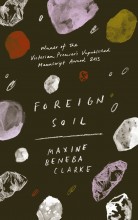 Maxine Beneba Clarke is a performance poet, acutely aware of the accents, idioms and cadences of the spoken word, and her gift with voices – their origins, their meanings, their struggles and triumphs with alien English – is at the heart of this collection of stories. All ten stories deal with displacement in some form, and some of that displacement has been violent: there are stories of racial conflict in Brixton, of asylum seekers in flight from the Tamil Tigers, of psychological and physical violence between a naïve white-Australian wife in a strange land and her twice-displaced African husband.
Maxine Beneba Clarke is a performance poet, acutely aware of the accents, idioms and cadences of the spoken word, and her gift with voices – their origins, their meanings, their struggles and triumphs with alien English – is at the heart of this collection of stories. All ten stories deal with displacement in some form, and some of that displacement has been violent: there are stories of racial conflict in Brixton, of asylum seekers in flight from the Tamil Tigers, of psychological and physical violence between a naïve white-Australian wife in a strange land and her twice-displaced African husband.
Although these are stories about inequalities of power in the intersections of class and race, Beneba Clarke also uses narrative voices and the effects of dialogue to show characters attempting to create and assert a coherent self through the power of speech. Her work is profoundly political, but it is also more than that.
About Maxine Beneba Clarke
Maxine Beneba Clarke is a widely published Australian writer of AfroCaribbean descent and the author of the poetry collections Gil Scott Heron is on Parole (Picaro Press, 2009) and Nothing Here Needs Fixing (Picaro Press, 2013). Her debut short story collection, Foreign Soil, won the 2013 Victorian Premier’s Unpublished Manuscript Award. Maxine lives in Melbourne.
The Strays – Emily Bitto (Affirm Press)
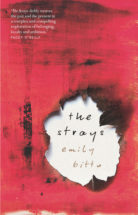 Lily is an only child, and when she befriends the exotic Eva – daughter of artists and ‘old money’ – at school, it’s the beginning of the kind of love affair that solitary children often have with large exuberant families. But this is bohemian Melbourne in the 1930s, and in many ways it’s not a good place for any child to be. As the girls grow up their world gets darker and more complex, eventually imploding into scandal.
Lily is an only child, and when she befriends the exotic Eva – daughter of artists and ‘old money’ – at school, it’s the beginning of the kind of love affair that solitary children often have with large exuberant families. But this is bohemian Melbourne in the 1930s, and in many ways it’s not a good place for any child to be. As the girls grow up their world gets darker and more complex, eventually imploding into scandal.
While it’s partly inspired by the real-life 1930s artists’ colony at Heide in Melbourne, this novel’s characters and plot are wholly fictional and the result is a satisfyingly cohesive vision and story. With its reflective tone, rhythmic style, and vivid scenes, Bitto’s novel illuminates the history of a particular time, place and way of living, but it also draws out the more abstract themes, common to all times and places, of friendship, memory, ambition, and family life.
About Emily Bitto
Emily Bitto has a Masters in Literary Studies and a PhD in Creative Writing from the University of Melbourne, where she is also a sessional teacher and supervisor in the creative writing program. The manuscript of her debut novel, The Strays, was shortlisted for the 2013 Victorian Premier’s Literary Award for an Unpublished Manuscript.
Only the Animals – Ceridwen Dovey (Penguin)
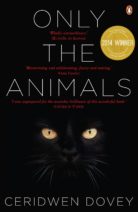 In this collection of stories, closely linked by subject and theme, the souls of ten animals speak to the reader. All ten have died in some kind of human conflict: a fastidious cat in the Great War trenches, an oversexed mussel in Pearl Harbor, a philosophical parrot abandoned in war-torn Beirut. Ceridwen Dovey adds a further layer of meaning and allusion by linking each animal to one or more writers: the wartime cat is a pet of Colette’s, the ape and the tortoise come from stories by Kafka and Tolstoy respectively, and the camel is camped in the middle of a scenario by Henry Lawson.
In this collection of stories, closely linked by subject and theme, the souls of ten animals speak to the reader. All ten have died in some kind of human conflict: a fastidious cat in the Great War trenches, an oversexed mussel in Pearl Harbor, a philosophical parrot abandoned in war-torn Beirut. Ceridwen Dovey adds a further layer of meaning and allusion by linking each animal to one or more writers: the wartime cat is a pet of Colette’s, the ape and the tortoise come from stories by Kafka and Tolstoy respectively, and the camel is camped in the middle of a scenario by Henry Lawson.
For so artfully structured and layered a book, this collection of stories both gives out and calls up an intensity of feeling rarely encountered in such cleverly self-referential writing. The book both avoids sentimentality and obliges readers to consider closely their own attitude to animals. And perhaps then to reconsider it.
About Ceridwen Dovey
Ceridwen Dovey was born in South Africa and raised between South Africa and Australia. She studied social anthropology at Harvard as an undergraduate and received her Masters in social anthropology from New York University. Her debut novel, Blood Kin, was published in fifteen countries and shortlisted for the Dylan Thomas Award. Ceridwen lives in Sydney.
This House of Grief – Helen Garner (Text Publishing)
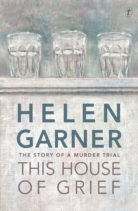 It’s been ten years since Robert Farquharson’s car veered off a road in country Victoria after dark and careered into a dam, where his three sons, trapped inside, were drowned. Helen Garner’s unique brand of reportage is again evident in her account of the drowning and its aftermath, which largely took place in courtrooms, and which culminated in Farquharson’s conviction and imprisonment for the murder of his children.
It’s been ten years since Robert Farquharson’s car veered off a road in country Victoria after dark and careered into a dam, where his three sons, trapped inside, were drowned. Helen Garner’s unique brand of reportage is again evident in her account of the drowning and its aftermath, which largely took place in courtrooms, and which culminated in Farquharson’s conviction and imprisonment for the murder of his children.
In her exploration of the corrosively drawn-out process that followed in the courts, in the media, and in the community, Garner situates herself as a courtroom observer and reporter who does not claim dispassionate impartiality, but maintains a thoughtful, engaged, open-minded commentary that invites readers’ responses. With her trademark stylistic precision and lucidity, she shows how her own and everyone else’s immediate human reactions to such a story – horror, sympathy, empathy, instinct – are balanced against the relentlessly formal logic and causality that shape the due process of the law.
About Helen Garner
Helen Garner was born in 1942 in Geelong, and was educated there and at Melbourne University. Her first novel, Monkey Grip, won the 1978 National Book Council Award. Since then she has published novels, short stories, essays, and feature journalism including The First Stone, Joe Cinque’s Consolation and The Spare Room. Helen Garner lives in Melbourne.
Golden Boys – Sonya Hartnett (Penguin)
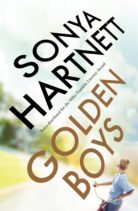 Children have their own rules and laws, separate and often secret from the adult world. This vividly imagined and quietly disturbing novel, focused on two neighbouring families, is about a group of boys on the cusp of adolescence, over a few weeks of summer. Sonya Hartnett shows the operations of the secret codes of children: their instinctive understanding and deft negotiation of each others’ personalities, and their struggles to understand and deal with adult treachery and abuse.
Children have their own rules and laws, separate and often secret from the adult world. This vividly imagined and quietly disturbing novel, focused on two neighbouring families, is about a group of boys on the cusp of adolescence, over a few weeks of summer. Sonya Hartnett shows the operations of the secret codes of children: their instinctive understanding and deft negotiation of each others’ personalities, and their struggles to understand and deal with adult treachery and abuse.
Hartnett has a brilliant gift for creating an atmosphere of menace, and she does not fear the dark. She explores the effects of bullying and manipulation, of drunken domestic violence and sinister predatory enticement. Differences of class, religion and income might affect the ways in which adult weakness manifests itself, but the flaws in all four parents from the Jenson and Kiley families create situations in which the children must make their own rules to survive.
About Sonya Hartnett
Sonya Hartnett’s work has won numerous Australian and international literary prizes and has been published around the world. Her books include Of A Boy, Surrender, Butterfly, Thursday’s Child, Forest, The Silver Donkey, The Ghost’s Child, The Midnight Zoo and The Children of the King. Hartnett was the first Australian recipient of the Astrid Lindgren Memorial Award.
The Invisible History of the Human Race – Christine Kenneally (Black Inc)
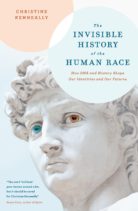 The sciences and the humanities are traditionally thought of as separate, or even as opposite, fields of study and endeavour, but Christine Kenneally moves on from this kind of thinking in her fascinating exploration of DNA and what it tells us about our individual, social, and anthropological pasts, bringing genetics and history together via the concepts of ancestry and inheritance. At every stage of this book, the data, the facts and the ideas are illustrated and enlivened by personal stories of individual lives and discoveries.
The sciences and the humanities are traditionally thought of as separate, or even as opposite, fields of study and endeavour, but Christine Kenneally moves on from this kind of thinking in her fascinating exploration of DNA and what it tells us about our individual, social, and anthropological pasts, bringing genetics and history together via the concepts of ancestry and inheritance. At every stage of this book, the data, the facts and the ideas are illustrated and enlivened by personal stories of individual lives and discoveries.
Kenneally uses the contemporary enthusiasm for genealogy and family history as an accessible entry point for the general reader, giving us a wonderful assortment of insights into the meaning and value of the past. To read this book is to be in the company of a dynamic, ardent mind, talking in a friendly authorial voice and never talking down.
About Christine Kenneally
Christine Kenneally is an award-winning journalist and author who has written for the New Yorker, the New York Times, Slate, Time magazine, New Scientist, the Monthly, and other publications. She is the author of The First Word: The Search for the Origins of Language, which was a finalist for the Los Angeles Times Book Award. She currently lives in Melbourne.
The Eye of the Sheep – Sofie Laguna (Allen & Unwin)
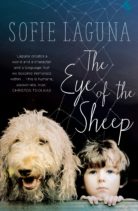 Jimmy Flick isn’t an ordinary child, and as his story progresses we quickly realise that he has some unspecified condition, probably somewhere on the autism spectrum. He can’t slow down, he can’t calm down, and he can’t respond appropriately in difficult or even dangerous situations, but his world view is unique and full of unexpected insights. His father, defeated by the difficulties of living with such a child, takes to drink and domestic violence. And then things get worse.
Jimmy Flick isn’t an ordinary child, and as his story progresses we quickly realise that he has some unspecified condition, probably somewhere on the autism spectrum. He can’t slow down, he can’t calm down, and he can’t respond appropriately in difficult or even dangerous situations, but his world view is unique and full of unexpected insights. His father, defeated by the difficulties of living with such a child, takes to drink and domestic violence. And then things get worse.
Sofie Laguna faultlessly maintains the storytelling voice of Jimmy, who is oblivious in some ways and hauntingly knowing and observant in others. There are many places in which such a story could tip over into sentimentality or melodrama, but Laguna’s authorial control and intelligence keep the story on track and the reader engaged and empathetic, and she manages both the humour and the darkness of this story with great sensitivity and control.
About Sofie Laguna
Sofie Laguna is an author, actor and playwright. Her books for young people have been named Honour Books and Notable Books in the Children’s Book Council of Australia Book of the Year Awards and have been shortlisted in the Queensland Premier’s Awards. Sofie’s first novel for adults, One Foot Wrong, was published throughout Europe, the United States and the United Kingdom.
The Golden Age – Joan London (Random House)
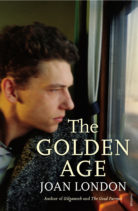 The time is the early 1950s, the place Perth. The Gold family, survivors and refugees from wartime Europe, have been blasted by the fates once more: their only child, Frank, has been caught up in the polio epidemic and is now recovering in a halfway house for convalescent children, a converted pub called The Golden Age.
The time is the early 1950s, the place Perth. The Gold family, survivors and refugees from wartime Europe, have been blasted by the fates once more: their only child, Frank, has been caught up in the polio epidemic and is now recovering in a halfway house for convalescent children, a converted pub called The Golden Age.
Through the Gold family and their various acquaintances, London explores the social and emotional implications of her story with quiet power and precision, using the tale of one family at one moment in the social history of Australia to illustrate more abstract and general themes. It’s a story of exile, transition, and resilience; it shows the power of vocation and the fragility of love. And in its account of how it feels to belong to a displaced, marginalised and vulnerable race recently threatened with genocide, it has some delicate reverberations for the oldest Australians as well as for the newest.
About Joan London
Joan London is the author of two prize-winning collections of stories, Sister Ships and Letter to Constantine. Her first novel, Gilgamesh, won the Age Book of the Year for Fiction and was longlisted for the Orange Prize and the International IMPAC Dublin Literary Award. Her second novel, The Good Parents, won the Christina Stead Prize for fiction in the NSW Premier’s Literary Awards.
Laurinda – Alice Pung (Black Inc)
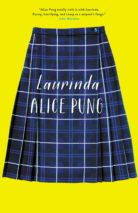 Set in the 1990s, before social media and mobile phones dominated adolescent social life, Alice Pung’s novel tells the story of Lucy Lam, a working-class child from a Chinese family who wins a scholarship to attend the ‘exclusive’ private girls’ school Laurinda. Here she encounters a group of girls known as The Cabinet: they are the school’s shiny trophies, and there’s also a suggestion of the political meaning of ‘cabinet’, for these girls have a lot of power in their small society.
Set in the 1990s, before social media and mobile phones dominated adolescent social life, Alice Pung’s novel tells the story of Lucy Lam, a working-class child from a Chinese family who wins a scholarship to attend the ‘exclusive’ private girls’ school Laurinda. Here she encounters a group of girls known as The Cabinet: they are the school’s shiny trophies, and there’s also a suggestion of the political meaning of ‘cabinet’, for these girls have a lot of power in their small society.
The story is told in letters from Lucy to her old friend Linh, but Pung gives this tradition a clever and surprising twist. This novel is much more than just a story of high school; it explores the workings of class conflict and racial difference in a hothouse atmosphere and it’s an incisive critique of the limitations of a privileged upbringing. Formally categorised as ‘Young Adult’, this novel is an equally compelling read for adults, skilfully written and full of insight and ideas.
About Alice Pung
Alice Pung is a writer, editor, teacher and lawyer based in Melbourne. Alice’s previous books include Unpolished Gem and Her Father’s Daughter. She is the editor of the anthology Growing Up Asian in Australia, and her work has appeared in the Monthly, Good Weekend, the Age, The Best Australian Stories and Meanjin.
Nest – Inga Simpson (Hachette)
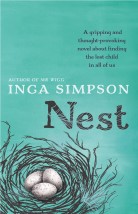 Now middle-aged, Jen lives alone in the rainforest landscape of her childhood, where the dark stories from that time still haunt her. Once a teacher, she’s now an artist who gives private lessons to a talented schoolboy who functions as a conduit, giving her news of the local community. So when he arrives one day disturbed by the disappearance of a fellow student, it’s the beginning of a long story that winds back into the past.
Now middle-aged, Jen lives alone in the rainforest landscape of her childhood, where the dark stories from that time still haunt her. Once a teacher, she’s now an artist who gives private lessons to a talented schoolboy who functions as a conduit, giving her news of the local community. So when he arrives one day disturbed by the disappearance of a fellow student, it’s the beginning of a long story that winds back into the past.
Inga Simpson is known for her nature writing, and this novel’s most unusual aspect is the frequency with which the plot takes a back seat to the minutiae of plant and bird life – the things that most concern Jen in her artist persona – about which Simpson writes in fine and gorgeous detail. The central metaphor of the nest is ever-present, but is neither simple nor overdone; she handles her subject matter lightly and obliquely, with subtlety and a real understanding of the psychology of loss and grief.
About Inga Simpson
Inga Simpson began her career as a professional writer for government before gaining a PhD in creative writing. In 2011, she took part in the Queensland Writers Centre Manuscript Development Program and as a result, Hachette published her first novel, the acclaimed Mr Wigg, in 2013.
Heat and Light – Ellen van Neerven (UQP)
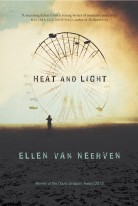 This unusually structured collection of stories is divided into three sections, each named for some elemental quality in nature: Heat, Water, Light. They are environmental metaphors that serve as rich touchstones for the layered meanings of individual stories. ‘Heat’ is a sequence of closely interlinked family stories; ‘Water’, a futuristic novella, is kind of ecological speculative fiction and a very unusual love story; ‘Light’ is a collection of stand-alone stories, though certain themes and subjects recur here as they do throughout the book.
This unusually structured collection of stories is divided into three sections, each named for some elemental quality in nature: Heat, Water, Light. They are environmental metaphors that serve as rich touchstones for the layered meanings of individual stories. ‘Heat’ is a sequence of closely interlinked family stories; ‘Water’, a futuristic novella, is kind of ecological speculative fiction and a very unusual love story; ‘Light’ is a collection of stand-alone stories, though certain themes and subjects recur here as they do throughout the book.
Van Neerven moves with ease between realism and fantasy, using elements of myth and mysticism in her storytelling. From one story to the next, the content is always rich and suggestive and the writing is always beautiful and clever. Each of these stories is told with passion and conviction; van Neerven writes with the confidence, maturity, and subtlety of someone twice her age, and with startling originality.
About Ellen van Neerven
Born in Brisbane in 1990 to Aboriginal and Dutch parents, Ellen van Neerven is a Yugambeh woman with traditional ties to the country between the Logan and Tweed rivers. She won the David Unaipon Award in the 2013 Queensland Literary Awards for Heat and Light. Ellen lives in Brisbane.
In My Mother’s Hands – Biff Ward (Allen & Unwin)
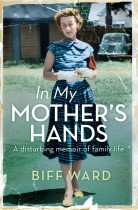 In 1950s Sydney, at the height of the Cold War, Biff Ward was the pre-teenage daughter of unusual parents: her mother was an undiagnosed paranoid schizophrenic and her father a prominent member of the Communist Party. In subsequent years, her historian father Russel Ward would become well known as the author of The Australian Legend, while her mother descended deeper into the mental illness whose first manifestation had been the mysterious death of her first child Alison, who had drowned, as an infant, in the bath.
In 1950s Sydney, at the height of the Cold War, Biff Ward was the pre-teenage daughter of unusual parents: her mother was an undiagnosed paranoid schizophrenic and her father a prominent member of the Communist Party. In subsequent years, her historian father Russel Ward would become well known as the author of The Australian Legend, while her mother descended deeper into the mental illness whose first manifestation had been the mysterious death of her first child Alison, who had drowned, as an infant, in the bath.
This memoir is a moving and disquieting account of life in a family where silence ruled and nobody felt safe, but where everyone remained as loyal, and even as loving, as they could. Ward’s story of her family, and especially of her mother, is full of insight and frank intelligence, and shows what terrible stress and struggle sometimes went on behind closed doors in an era that stigmatised mental illness and idealised traditional family life.
About Biff Ward
Biff Ward has worked in radical secondary education, equal opportunity, Indigenous adult education, human resource development and mental illness education. Her poetry and essays appeared in anthologies in the 80s and 90s. She lives on the Monaro, in Canberra.
The 2015 Stella Prize shortlist will be announced at 12 noon AEDT on Thursday 12 March. The 2015 Stella Prize will be awarded in Melbourne on the evening of Tuesday 21 April.
Watch nine of the longlisted authors read from their remarkable books in this video of our special online event, Presenting the Stella Prize Longlist.
For further information or media enquiries regarding the 2015 Stella Prize longlist, click here.

